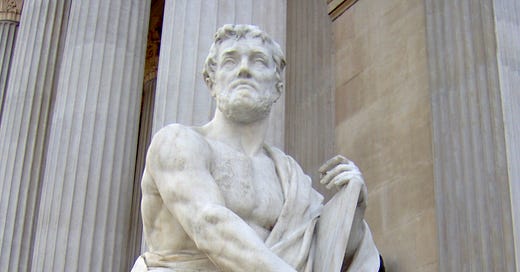This is part one of a multipart series.
I grew up in a very Christian family. We went to church, and I read the Bible some, and was familiar with all the popular Bible stories. I was fairly young when I rejected the Christian theology of my parents, because it just didn’t feel true to me. And yet, this Jesus character was absolutely fascinating. Not only did he purportedly perform some amazing healings and magical feats, but he preached some pretty profound shit. So while I wasn’t going to be a Christian for decades to come, I was always interested in figuring out who this Jesus guy really was, and what he actually did.
When we begin to look into who Jesus really was, we encounter an immediate difficulty: We must question the reliability of the sources we have that talk about Jesus’s actions and teachings. Take, for example, the Gospel of Matthew. It presents a detailed and descriptive story about Jesus’s life. If we could trust the author’s words, then when we read the text, we would come away with the feeling that we learned a great deal about who Jesus was, and what he was like. But we know that the author’s goal was not simply to provide a historical account. The author is a Christian, and presumably wants their readers to be Christians too. They may well have fabricated stories or sayings, or embellished more factual accounts, in order to make the case for Christianity more persuasive. Not to mention, it is highly unlikely Matthew’s author ever saw or met Jesus, making these second hand accounts at best.
I’ve gathered a number of heuristics, or rules of thumb, over the years to judge the accuracy of the accounts of Jesus’s sayings and actions that we might come across, and I want to share them with you here. To be clear, none of this is original research or thinking. And I am well aware that many people have gone very deeply into these matters. Far deeper than I have. My goal here is to go over the major points, keeping things non-scholarly, straightforward, and as brief as I can manage. This basic guide should be an easy read, and give you some tools to provide a little extra context when you encounter a Jesus story or quote.
Now, unfortunately, I have to start with the historicity of Jesus himself, as there are people who will deny he ever even existed. We’ll tackle that here today, and move on to examining my Actual Jesus Heuristics™ in future essays.
The general outline of the Jesus story, minus the theology, is pretty much historical fact: Jesus was born to Jewish parents in Israel around the turn of the millennium. When he grew up, he became a religious teacher whose revolutionary ideas conflicted with established Jewish theology and power structures. He gained quite a following, which only increased after he was tried and killed for blasphemy. Over the generations, this following evolved into the Christian religion.
How do we know all this to be true? This Wikipedia article on the historicity of Jesus will serve you well if you want to dive deep into the question. I will summarize what I think are the three most compelling points.
Flavius Josephus, a Roman-Jewish historian from the first century AD, attests to the historicity of Jesus twice in his history Antiquities of the Jews. Being a non-Christian and a well respected historian, there is no reason to doubt his motives in these attestations. That said, the earliest surviving manuscripts we have are from the 9th and 10th centuries, and as such, they are, in true Fight Club fashion, a copy of a copy of a copy. And many of those copyists were Christians, who could have added or modified text relating to Jesus. The following passage from Book 20, Chapter 9, however, is almost universally considered by scholars to be authentic1:
So [Ananus] assembled the sanhedrin of judges, and brought before them the brother of Jesus, who was called Christ, whose name was James, and some others; and when he had formed an accusation against them as breakers of the law, he delivered them to be stoned.
The second passage in the Antiquities that mentions Jesus, called the Testimonium Flavianum, is much more controversial. While some scholars argue that the passage is a complete forgery, and others argue that it is entirely authentic, the general consensus is that it is partially authentic, with Christian interpolations.2 From Book 18, Chapter 3:
Now there was about this time Jesus, a wise man, if it be lawful to call him a man; for he was a doer of wonderful works, a teacher of such men as receive the truth with pleasure. He drew over to him both many of the Jews and many of the Gentiles. He was the Christ. And when Pilate, at the suggestion of the principal men amongst us, had condemned him to the cross, those that loved him at the first did not forsake him; for he appeared to them alive again the third day; as the divine prophets had foretold these and ten thousand other wonderful things concerning him. And the tribe of Christians, so named from him, are not extinct at this day.
In the very least, we would expect Josephus to take a neutral attitude towards Jesus. He would certainly not call him the Christ. We might imagine the text as originally written by Josephus to read like this:
Now there was about this time Jesus, a wise man, who drew over to him both many of the Jews and many of the Gentiles. And when Pilate, at the suggestion of the principal men amongst us, had condemned him to the cross, those that loved him at the first did not forsake him. And the tribe of Christians, so named from him, are not extinct at this day.
It’s really a shame that some Christian scribe(s) had to deface this passage, as it muddies the waters on what would otherwise be the best historical reference to Jesus from a non-Christian source. But so it goes.
Another Roman historian, Tacitus, references Jesus in his book The Annals of Imperial Rome, written circa 116 AD. He describes Jesus in passing as he tells about how Nero used the Christians as a scapegoat for the burning of Rome, to avoid blame falling upon himself. From book 14, chapter 44:
… called Christians by the populace. Christus, from whom the name had its origin, suffered the extreme penalty during the reign of Tiberius at the hands of one of our procurators, Pontius Pilatus.
This is an independent attestation by a person who shows no sympathy for Christianity. Scholars generally consider it to be authentic, and it is in agreement with other historical records.
And there are other non-Christian, historical records of Jesus’s life and death. But probably the most compelling evidence for a historical Jesus is the early Christian church itself, and the writings of members of that church. It’s hard to imagine how a group of people could get so worked up about Jesus if he had not even been a real human being. Perhaps he was not what they claimed him to be, but that he didn’t exist at all, is practically impossible.
Take, for instance, the Gospel of Mark, which was written within 40 years of Jesus’s death. While not exclusively a history, this text of over 11 thousand words documents the life and death of Jesus. Did the author just make it all up? Perhaps the hoax started earlier in the budding Christian community. But what motivation would there be for creating such an elaborate fiction?
Similarly, we have seven letters from Paul that are nearly universally agreed to be authentic, dating from 15 to 30 years after Jesus’s death. These letters attest to the life and death of Jesus, and also provide a great deal of insight into the activities of a very early Christian community.
Indeed, the early Christian community was quite zealous in many ways, including in writing things down. Aside from the 27 canonical books of the New Testament, there are perhaps 50 or 60 surviving apocryphal documents, and the vast majority of these either imply or explicitly attest to the life and death of the flesh and blood human being we call Jesus.
It’s noteworthy that the Roman sources we looked at are only interested in Jesus because of the Christians. Jesus himself was completely inconsequential to them, but the Christians were a serious problem. They were constantly growing in number despite brutal persecution by the Romans. And they just wouldn’t go along with the rules. Why were they so zealous? Perhaps it was due in part to some larger social forces, but certainly some of it must have been due to Jesus himself.
Keep in mind that the Christian community didn’t evolve gradually. It popped up out of nowhere right around the time of Jesus’s death.
We know that Jesus was born of the flesh and died on the cross. And there must have been something fantastic about his life to cause the early Christians to be so fanatical. But who was he, actually? What did he actually say and do? To answer this, we must consult ancient texts of dubious reliability. When considering a passage of text concerning Jesus, how do we judge the likelihood of its veracity? We’ll start looking into this in the next essay.
Scholars generally consider this passage to be authentic for several reasons:
Lack of Christian Doctrinal Elements: The passage does not contain overtly Christian doctrinal elements that might suggest later Christian interpolation. It describes the events in a neutral and historical tone.
Embarrassment Criterion: The content of the passage might be seen as potentially embarrassing to Christians. It narrates the execution of James, and Christian scribes might have been less likely to insert a passage that portrays a key figure in early Christianity in a negative light.
Style and Language Consistency: The style and language of the James passage are consistent with Josephus's writing style.
Contextual Fit: The passage fits well into the broader context of Josephus's narrative about the period and events in which James lived. It doesn't appear as an abrupt insertion but flows within the overall historical account.
The general consensus is that the Testimonium Flavianum is authentic with Christian interpolations. It’s too complicated and off-topic for me to go into it here. If you’re interested, this section on Wikipedia covers the matter very thoroughly, without too much bias.







Oops, I seem to have published this essay with comments for paid subscribers only. My mistake! It's open to everyone now.
Very good: informative and well-written. Thank you.